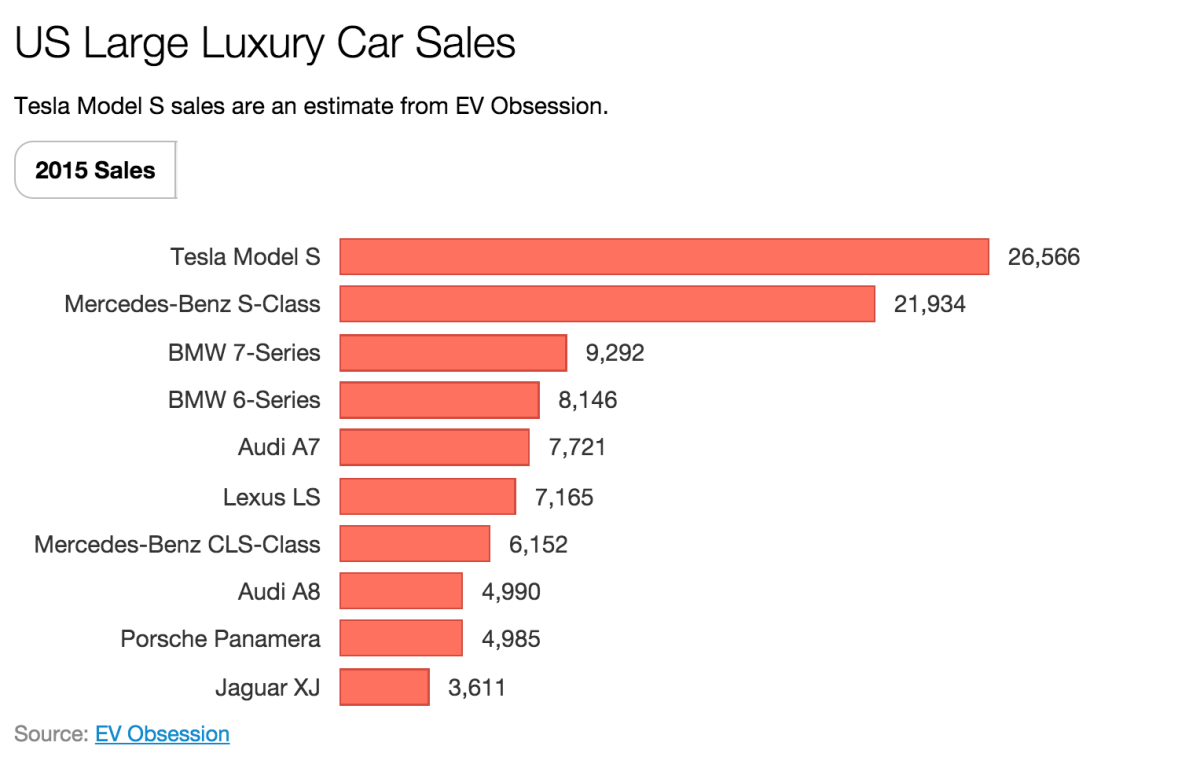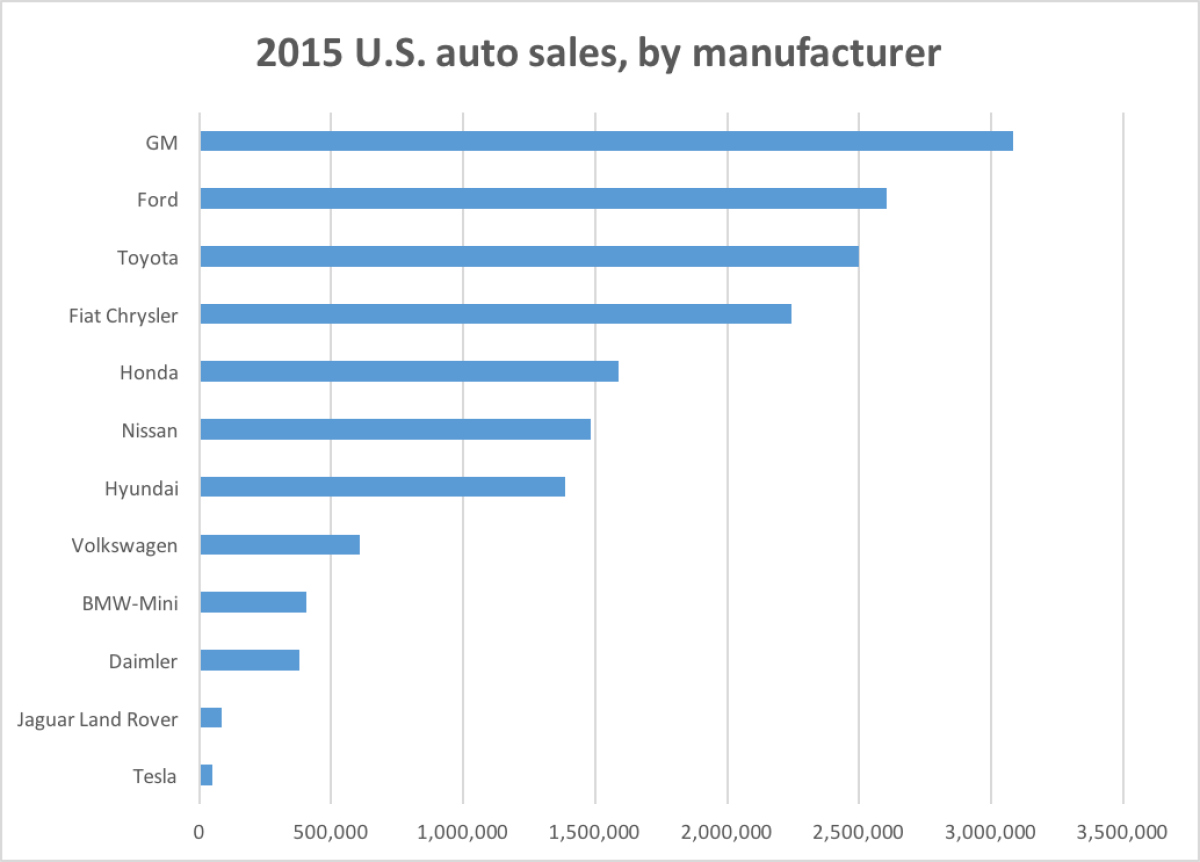Column: Tesla brought down by ‘hubris’? Who could have expected that?
Tesla Motors Inc. pulled a pretty slick fake-out on investors and fans Monday by revealing, to their surprise, that it had delivered only 14,820 cars to customers in the first quarter of 2016, well short of its projected deliveries of 16,000 cars. Tesla Founder Elon Musk attributed the miss to the "hubris" of stuffing so much new technology into its top-of-the-line Model X (base price: $80,000) that its suppliers couldn't produce parts fast enough to keep up the pace.
The news took down Tesla stock by about 2%, to $242.02, in the first minutes of trading Tuesday. That's steeper than Tuesday's selloff in the broad market, but given how Tesla shares have been on a tear lately, the decline could almost be counted as a victory, especially since the shares started to recover within the first hour of trading. That's been Tesla's recent pattern: Investors walk nervously past signposts of trouble, and finally fetch up at the stand where Musk dispenses his proprietary brand of unalloyed optimism. [UPDATE: Tesla shares closed Tuesday at $255.47, up 3.43%, its highest close thus far this year..]
The Model X is an amazing car. Honestly, I think it's probably, I think it's the best car ever. I'm not sure anyone's going to make a car like this again.
— Elon Musk does his best Donald Trump impression for analysts on Feb. 10.
Musk deserves admiration for his dedication to the cause of clean transportation and the battle against climate change, or at least to shifting emissions from auto tailpipes to electrical generation, which is increasingly fueled by renewable sources. His corporate mission was on display last week, when he unveiled Tesla's Model 3 sedan, which will be mass-marketed at a projected starting price of $35,000, to great acclaim. But declaring one's commitment to the climate and driving the auto press around in prototype cars is relatively easy (especially if you don't let anyone look under the hood) compared to mass-manufacturing actual vehicles.
There's no reason to gloss over some cold, hard facts. Monday's disclosure underscores several disquieting aspects of Tesla's business performance and Musk's management. One is Musk's tendency to overpromise results and make up the difference with hype when he comes up short. Another is the magnitude of the challenges facing the company as it attempts to ramp up manufacturing to meet demand for the Model 3 sedan, expected to hit the streets as early as year-end 2017. (We delved last week into the likelihood of that happening.)
In fact, no one should be surprised at the shortfall in deliveries. Musk telegraphed the manufacturing problems as recently as Feb. 10, during a conference call about Tesla's fourth-quarter earnings. That's when he originally used the term "hubris" to explain manufacturing problems with the Model X.
"We put too many new features and technologies, too many great things all at once into a product," he said. "I do think there was some hubris there with the X. The net result, however, is that I think the Model X is an amazing car. Honestly, I think it's probably, I think it's the best car ever. I'm not sure anyone's going to make a car like this again."

Musk and his team also hinted at the sheer unpredictability they've discovered to be a feature of the auto manufacturing process. They ran into supply bottlenecks not only with advanced-tech parts, such as the X's large glass windshield, but small things. Musk referred to problems with the finish around the front window, especially the seals. "The seals have been a huge bane. Essentially, the seals had to be redesigned. Then the seals that we did have had to be reworked by hand in order to fit correctly."
Other glitches alluded to included problems with the paint shop at Tesla's California manufacturing plant, write-offs for excess and obsolete inventory, and quality problems with existing cars that translate into warranty costs. Musk and his executives maintained on the Feb. 10 call that they're putting these problems behind them. But they point to the reality that in manufacturing products as complicated as automobiles, new issues crop up all the time.
Musk maintained that the Model 3 has been designed specifically for ease of manufacturing. Yet it won't be entirely off-the-shelf. The prototype unveiled to great eclat last week incorporates an all-glass roof designed to look like a single pane running from windshield to rear trunk. Actually, it's at least two pieces with an invisible seam, but that will require manufacturing tolerances that may not be so easy to meet, especially at high volume. One supply glitch in an assembly line ramping up to 500,000 cars per year, Musk's goal, and a lot of hopes can come crashing down.

Tesla executives tried to gloss over these uncomfortable implications in their Feb. 10 presentation, at which they reaffirmed the projection of 16,000 deliveries. When an investment analyst on the call misspoke and referred to "16,000 deliveries this year," CFO Jason Wheeler interrupted to say, "This quarter." As Chuck Jones of Forbes observes, that was "pretty far into the quarter," when executives "would have been in full knowledge of the parts problems."
Tesla's ability to cloud investors' judgments resembles that of some other subjects of intense media attention. In the business world, there's Apple, but in the broader context, the publicity bonanza Tesla reaped last week by unveiling a prototype automobile that won't actually be available for sale for at least another 18 months was almost Trump-esque. Musk even alluded to the phenomenon during the earnings call.
"Tesla does not advertise," he said. "We don't pay for any endorsements. We do not discount our cars for anyone, including me." Nor did he seem to think that any conventional advertising would ever be necessary: "I think I could see us doing advertising where that advertising was interesting, entertaining, and people don't regret seeing it, which unfortunately is not the case for most advertising."
Why pay for advertising when it comes for free? News organizations devoted reams of newsprint and untold pixels to covering the Model 3 introduction — The Times ran no fewer than eight articles from a few days before to a few days following the April 1 event, and most drew heavy readership.
See the most-read stories this hour >>
As we pointed out last week, Tesla's future hinges in part on maintaining a strong stock price, which would lower the cost of its raising new capital through a secondary stock offering. So it's fair to expect continued expressions of optimism from Musk and his devotees. There will be regular announcements of new milestones in pre-orders for the Model 3 — the latest figure is 276,000, released by Musk on Monday. That's impressive, particularly if one overlooks that these orders are wholly conditional; customers need plunk down a deposit of $1,000, but it's fully refundable up to the point that their cars go into production.
At current interest rates, the deposits amount to a fee of as little as $10 a year for reserving a place in the order line, rather than an enforceable commitment to buy. With all-electric models from Chevrolet and other manufacturers expected to hit showrooms well ahead of the Model 3's arrival, many, even most, of those "buyers" could fade away by then. If that starts happening, however, don't expect Elon Musk to be shouting the news from the rooftops.
Keep up to date with Michael Hiltzik. Follow @hiltzikm on Twitter, see his Facebook page, or email [email protected].
Return to Michael Hiltzik's blog.
MORE ON TESLA
Tesla misses delivery target, citing company 'hubris'
Tesla hype watch: You know the Model 3 doesn't exist yet, right?
Tesla reveals some details about the Model 3 — and keeps others under wraps
UPDATES:
2:04 p.m.: This post has been updated with the closing price of Tesla stock.




